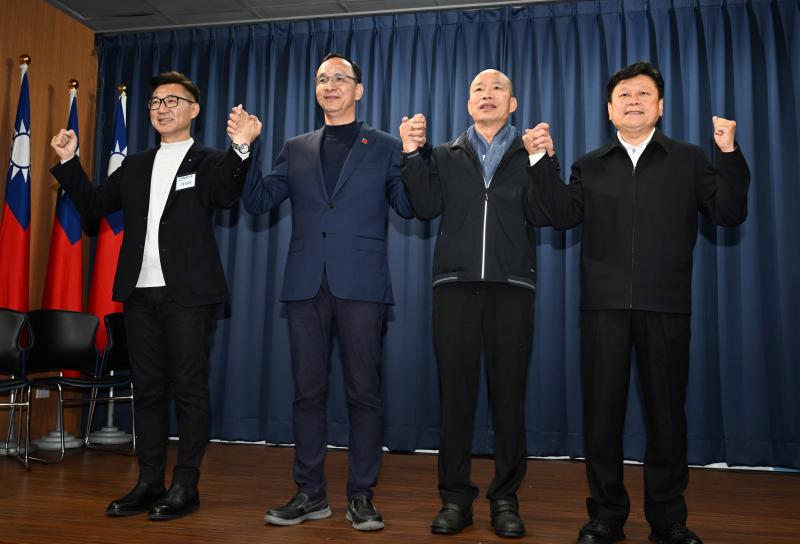Chinese Nationalist Party (KMT) legislator-elect Fu Kun-chi (傅崐萁) on Monday rescinded his candidacy for legislative speaker, removing the last challenge to former Kaohsiung mayor Han Kuo-yu (韓國瑜) and Legislator Johnny Chiang (江啟臣) before the party formalizes its ticket on Wednesday.
The announcement was a turnaround from the day before, when the former Hualien County commissioner held a news conference doubling down on his intention to run and outlining his platform.
Even before the news conference, KMT Chairman Eric Chu (朱立倫) had already given his support to Han and Chiang to run as speaker and deputy speaker respectively.

Photo: Tien Yu-hua, Taipei Times
The party on Monday held a meeting with its newly elected legislators, concluding in the change of heart by Fu.
“My personal honor is not important, it’s about improving the legislature,” Fu said.
Saying there was only one way to unite the party at this time, Fu endorsed the Han-Chiang ticket as the party’s consensus for the most competitive and robust option.
Chu thanked Fu for supporting Han and Chiang, who are to be formally nominated by the party on Wednesday.
Voting for the new speaker and deputy speaker is scheduled for Thursday next week, the first day of the new legislature.

The manufacture of the remaining 28 M1A2T Abrams tanks Taiwan purchased from the US has recently been completed, and they are expected to be delivered within the next one to two months, a source said yesterday. The Ministry of National Defense is arranging cargo ships to transport the tanks to Taiwan as soon as possible, said the source, who is familiar with the matter. The estimated arrival time ranges from late this month to early next month, the source said. The 28 Abrams tanks make up the third and final batch of a total of 108 tanks, valued at about NT$40.5 billion

Two Taiwanese prosecutors were questioned by Chinese security personnel at their hotel during a trip to China’s Henan Province this month, the Mainland Affairs Council (MAC) said yesterday. The officers had personal information on the prosecutors, including “when they were assigned to their posts, their work locations and job titles,” MAC Deputy Minister and spokesman Liang Wen-chieh (梁文傑) said. On top of asking about their agencies and positions, the officers also questioned the prosecutors about the Cross-Strait Joint Crime-Fighting and Judicial Mutual Assistance Agreement, a pact that serves as the framework for Taiwan-China cooperation on combating crime and providing judicial assistance, Liang

A group from the Taiwanese Designers in Australia association yesterday represented Taiwan at the Midsumma Pride March in Melbourne. The march, held in the St. Kilda suburb, is the city’s largest LGBTQIA+ parade and the flagship event of the annual Midsumma Festival. It attracted more than 45,000 spectators who supported the 400 groups and 10,000 marchers that participated this year, the association said. Taiwanese Designers said they organized a team to march for Taiwan this year, joining politicians, government agencies, professionals and community organizations in showing support for LGBTQIA+ people and diverse communities. As the first country in Asia to legalize same-sex

MOTIVES QUESTIONED The PLA considers Xi’s policies toward Taiwan to be driven by personal considerations rather than military assessment, the Epoch Times reports Chinese President Xi Jinping’s (習近平) latest purge of the Chinese People’s Liberation Army (PLA) leadership might have been prompted by the military’s opposition to plans of invading Taiwan, the Epoch Times said. The Chinese military opposes waging war against Taiwan by a large consensus, putting it at odds with Xi’s vision, the Falun Gong-affiliated daily said in a report on Thursday, citing anonymous sources with insight into the PLA’s inner workings. The opposition is not the opinion of a few generals, but a widely shared view among the PLA cadre, the Epoch Times cited them as saying. “Chinese forces know full well that